
The Hancock–Clarke House is a historic house in Lexington, Massachusetts, which is now a National Historic Landmark. Built in 1738, the house is notable as one of two surviving houses associated with statesman and Founding Father John Hancock, who lived here for several years as a child. It is the only residence associated with him that is open to the public. It played a prominent role in the Battle of Lexington and Concord as both Hancock and Samuel Adams, leaders of the colonials, were staying in the house before the battle. The House is operated as a museum by the Lexington Historical Society. It is open weekends starting in mid-April and daily from May 30–October 31. An admission fee is charged.

The Colonel John Ashley House is a historic house museum at 117 Cooper Hill Road in Sheffield, Massachusetts. Built in 1735 by a prominent local leader, it is one of the oldest houses in southern Berkshire County. The museum is owned and operated by The Trustees of Reservations, and is listed on the National Register of Historic Places.

The New Hampshire Governor's Mansion, known as "Bridges House", is the official residence of the governor of New Hampshire and the governor's family. Bridges House, located at 21 Mountain Road in Concord, the capital of New Hampshire, has served as the governor's official residence since 1969. Built in 1836, it was listed on the National Register of Historic Places in December 2005, and the New Hampshire State Register of Historic Places in July 2005.
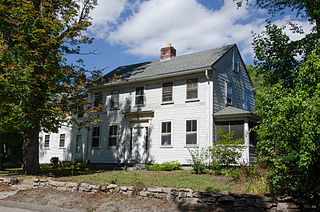
The E. Brown House is an historic house located at 7 Sutton Street, in Uxbridge, Massachusetts. It is a 2+1⁄2-story wood-frame structure, five bays wide, with a side-gable roof, central chimney, and clapboard siding. Despite its otherwise vernacular construction, it has fine quality Federal styling, with corner pilasters and cornice. The cornice and the door surround appear to be carved based on published drawings of Asher Benjamin. The western wing is a 20th-century addition.

The John Ward House is a National Historic Landmark at 9 Brown Street in Salem, Massachusetts, United States. With an early construction history between 1684 and 1723, it is an excellent example of First Period architecture, and as the subject of an early 20th-century restoration by antiquarian George Francis Dow, it is an important example of the restoration techniques. Now owned by the Peabody Essex Museum, it is also one of the first colonial-era houses in the United States to be opened as a museum. It was designated a National Historic Landmark in 1968.

The Wheeler-Merriam House is a historic house located at 477 Virginia Road in Concord, Massachusetts. With a construction history dating to about 1692, it is one of Concord's oldest buildings. It is also notable for having joinery by Abner Wheeler, a prominent local builder of the late 18th century, and for its long association with the locally prominent Wheeler and Merriam families. It was added to the National Register of Historic Places on November 26, 1982.

The Wheeler-Minot Farmhouse, also known as the Thoreau Farm or the Henry David Thoreau Birthplace, is a historic house at 341 Virginia Road in Concord, Massachusetts, United States. It is significant as the birthplace of writer Henry David Thoreau. The house was listed on the National Register of Historic Places in 2004. It currently serves as a historic house museum and is open to the public.

The Joseph Hosmer House is a historic First Period house located in Concord, Massachusetts.
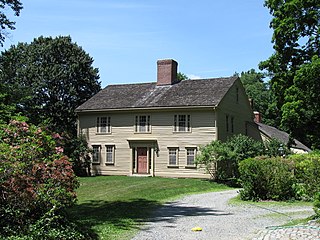
The Parkman Tavern is an historic tavern at 20 Powder Mill Road in Concord, Massachusetts. It is a 2+1⁄2-story timber-frame structure, built by ship's carpenters with wall frames wider at top of first story than base, five bays wide, with a side-gable roof, large central chimney with multiple ovens, and clapboard siding. It is estimated to have been built in the late 17th century (1659), by a member of the locally prominent Wheeler family. In the late 18th century it was purchased by William Parkman, great-uncle to historian Francis Parkman, who operated a tavern on the premises.

The Nathan Wood House is a historic house located in Westminster, Massachusetts. Built in 1756 by one of the town's early settlers, it is one of its oldest surviving buildings, and good example of colonial Georgian residential architecture. It was listed on the National Register of Historic Places on September 16, 1987.
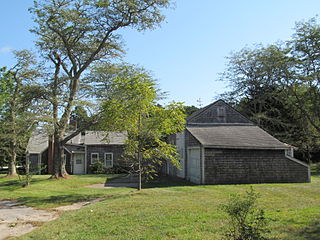
The Goodspeed House is a historic house in Barnstable, Massachusetts. It is believed to have been built by Roger Goodspeed, Marstons Mills' first settler. The house was listed on the National Register of Historic Places in 1987.

The Brown House is a historic First Period house in Hamilton, Massachusetts. Built in the 1660s or 1670s, it is one of the oldest surviving houses in Essex County. It was listed on the National Register of Historic Places in 1990.

The Henry Fletcher House is a historic house at 224 Concord Road in Westford, Massachusetts. Built c. 1810–13, it is a rare example of very late Georgian style timber-frame construction, with a large central chimney characteristic of colonial-era houses. It is styled with a mix of late Georgian and Federal style woodwork. The property's barn was also built by Henry Fletcher using the same construction methods. The house was listed on the National Register of Historic Places in 1993.
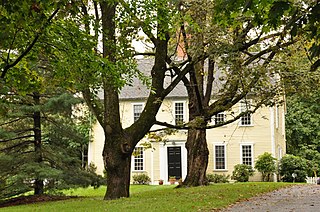
The Rev. Samuel Woodward House is a historic house located at 19 Concord Road in Weston, Massachusetts. Built in 1753, it is a well-preserved example of mid-18th century Georgian architecture. It has also been home to a succession of people significant to the history of the town. It was listed on the National Register of Historic Places in 1976, and was included in Weston's Boston Post Road Historic District in 1983.
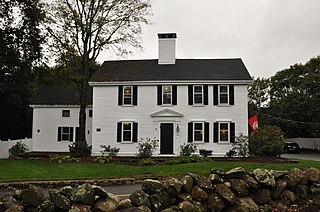
The Samuel Train House is a historic house in Weston, Massachusetts. Built about 1738, it is a good example of a mid-18th century colonial house. It was home to successive generations of Samuel Trains, who were all active in local politics and the state militia. The house was added to the National Register of Historic Places in 1976. It is used as office space for the Rivers School, whose main campus is located across the street.
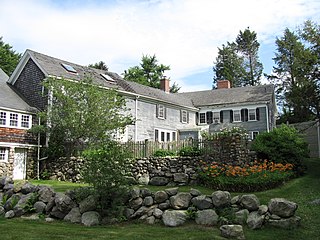
Hoar Tavern, or the Hoar Homestead, is a historic tavern and house northeast of downtown Lincoln on Reiling Pond Road in Lincoln, Massachusetts. With a construction history dating to 1680, it was for nearly two centuries home to the Hoar family, a prominent legal and political family in Massachusetts. It was listed on the National Register of Historic Places in 1973.

The Joseph Damon House is a historic house in Reading, Massachusetts. Built about 1754, this 2+1⁄2-story wood-frame house is good local example of a Georgian colonial house with later Federal period alterations. It also demonstrates a typical pattern of shared ownership by multiple descendants of one of its owners. The house was listed on the National Register of Historic Places in 1984.
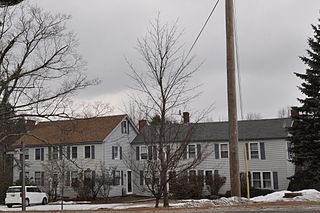
The Isaac Greenwood House is a historic house on New Hampshire Route 101 in eastern Dublin, New Hampshire, United States. The oldest portion of this house was built c. 1784 by Isaac Greenwood, a veteran of the American Revolutionary War. The house, a good example of additive architecture of the 19th century, was listed on the National Register of Historic Places in 1983.
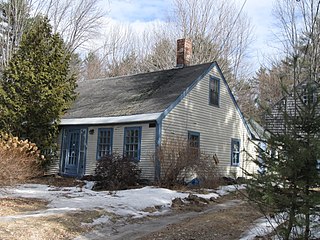
The House by the Side of the Road was a historic house at 61 School Street in Tilton, New Hampshire. The house, built circa 1783, was a modest 1+1⁄2-story Cape-style house five bays wide, with a center entry and a central chimney. The house was locally notable as the home of poet Sam Walter Foss in 1877–78, when he was attending Tilton Seminary, and was known as the "House by the Side of Road" after Foss's poem of the same name, since the 1890s. The house was listed on the National Register of Historic Places in 1980. It was demolished in March 2020.

Concord's Colonial Inn is a historic inn in Concord, Massachusetts. Its original structure, still in use, was built in 1716. It became a hotel in 1889.























